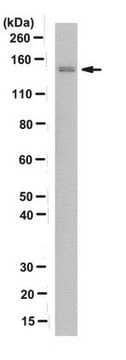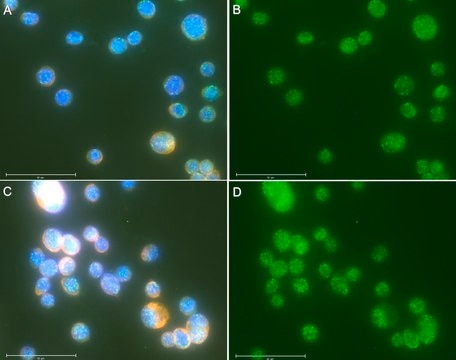MABE1109
Anti-HHV-8 LNA-1 Antibody, clone LN53
clone LN53, from rat
Synonym(s):
HHV-8/KSHV Orf73 LANA, HHV-8/KSHV Orf73 LNA, HHV-8/KSHV Orf73 LNA-1, HHV-8/KSHV Orf73 latency-associated nuclear antigen, HHV-8/KSHV Orf73 latent nuclear antigen, HHV-8/KSHV Orf73 latent nuclear antigen-1
About This Item
Recommended Products
biological source
rat
Quality Level
antibody form
purified immunoglobulin
antibody product type
primary antibodies
clone
LN53, monoclonal
species reactivity
human, rhesus macaque
technique(s)
ELISA: suitable
flow cytometry: suitable
immunocytochemistry: suitable
immunohistochemistry: suitable
immunoprecipitation (IP): suitable
isotype
IgG2cκ
GenBank accession no.
NCBI accession no.
shipped in
ambient
target post-translational modification
unmodified
Related Categories
General description
Specificity
Immunogen
Application
Flow Cytometry Analysis: A representative lot detected HHV-8 LNA-1 immunoreactivity in BCP-1, BC-3, and HBL-6 cells, but not in Daudi or Ramos cells (Kellam, P., et al. (1999). J. Virol. 73(6): 5149 5155).
Immunocytochemistry Analysis: A representative lot detected the transiently expressed KHSV ORF73 (HHV-8 LANA or LNA-1) as well as rhesus macaque retroperitoneal fibromatosis herpesvirus ORF73 (RFHV LANA) in the nuclei of transfected COS cells by fluorescent immunocytochemistry. No reactivity was detected toward pig-tailed macaque MneRV2 or rhesus macaque RRV LANA proteins (Burnside, K.L., et al. (2006). Virology. 354(1):103-115).
Immunocytochemistry Analysis: A representative lot detected HHV-8 LNA-1-positive nuclear bodies in primary effusion lymphoma (PEL) cell line BCP-1 by fluorescent immunocytochemistry, but not in Daudi or Ramos cells (Kellam, P., et al. (1999). J. Virol. 73(6): 5149 5155).
Immunohistochemistry Analysis: A representative lot detected RFHVMn LANA immunoreactivity in the nuclei of retroperitoneal fibromatosis (RF) tumor cells by immunohistochemistry staining of formalin-fixed, paraffin-embedded RF biopsies from an SIV-infected pig-tailed macaque. No immunoreactivity was detected using normal macaque jejunum tissue sections (Burnside, K.L., et al. (2006). Virology. 354(1):103-115).
Immunohistochemistry Analysis: Representative lots immunostained cells latently infected by HHV-8 by immunohistochemistry staining of paraffin-embedded patch, plaque, and nodular Kaposi s sarcoma (KS), multicentric Castleman s disease (MCD), and primary effusion lymphoma (PEL) tissue sections (Codish, S., et al. (2000). Am. J. Hematol. 65(4):310-314; Dupin, N., et al. (2000). Blood. 95(4):1406-1412; Dupin, N., et al. (1999). Proc. Natl. Acad. Sci. U. S. A. 96(8):4546-4551).
Immunohistochemistry Analysis: A representative lot detected nuclear HHV-8 LNA-1 immunoreactivity in cells within the nodular Kaposi s sarcoma (KS) lesion, but not in the surrounding dermis by immunohistochemistry staining of paraffin-embedded classical KS tumor sections (Kellam, P., et al. (1999). J. Virol. 73(6): 5149 5155).
Immunoprecipitation Analysis: A representative lot immunoprecipitated 220/230 kDa HHV-8 LNA-1 from primary effusion lymphoma (PEL) cell line BC-3, but not from Ramos cells (Kellam, P., et al. (1999). J. Virol. 73(6): 5149 5155).
Western Blotting Analysis: A representative lot detected the transiently expressed KHSV ORF73 (HHV-8 LANA or LNA-1) as well as rhesus macaque retroperitoneal fibromatosis herpesvirus ORF73 (RFHV LANA) in lysate from transfected COS cells. No reactivity was detected toward pig-tailed macaque MneRV2 or rhesus macaque RRV LANA proteins (Burnside, K.L., et al. (2006). Virology. 354(1):103-115).
Western Blotting Analysis: A representative lot detected the 220/230 kDa HHV-8 LNA-1 doublet in lysate from primary effusion lymphoma (PEL) cell line BC-3, but not from Ramos cells (Kellam, P., et al. (1999). J. Virol. 73(6): 5149 5155).
Quality
Immunocytochemistry Analysis (ICC): 1 µg/mL of this antibody immunostained HHV-8 LNA-1-positive nuclear bodies in Kaposi′s sarcoma-associated herpesvirus/human herpesvirus 8- (KSHV/HHV8-) infected BCBL-1 lymphoma cells.
Target description
Physical form
Other Notes
Legal Information
Not finding the right product?
Try our Product Selector Tool.
Storage Class Code
12 - Non Combustible Liquids
WGK
WGK 1
Flash Point(F)
Not applicable
Flash Point(C)
Not applicable
Certificates of Analysis (COA)
Search for Certificates of Analysis (COA) by entering the products Lot/Batch Number. Lot and Batch Numbers can be found on a product’s label following the words ‘Lot’ or ‘Batch’.
Already Own This Product?
Find documentation for the products that you have recently purchased in the Document Library.
Our team of scientists has experience in all areas of research including Life Science, Material Science, Chemical Synthesis, Chromatography, Analytical and many others.
Contact Technical Service








